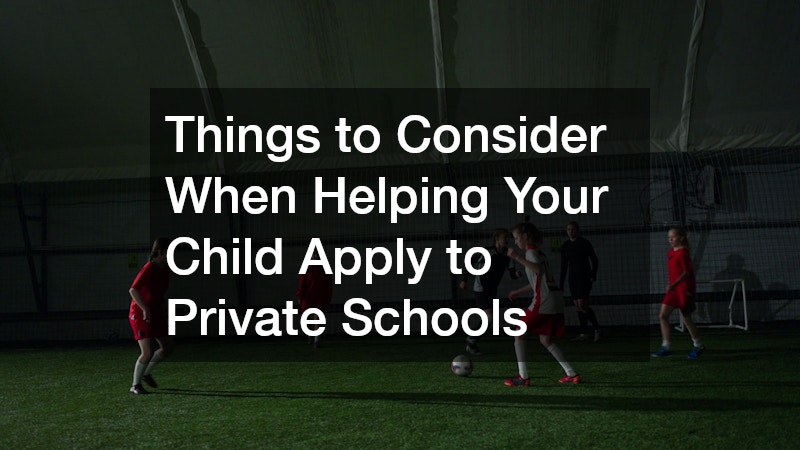Applying to private schools can be an exciting yet challenging process for families. It requires careful planning, thorough research, and thoughtful support to help your child succeed in gaining admission to the right school. Many parents want to make informed decisions that align with their child’s academic needs, interests, and personal growth. The process involves several steps, from understanding admissions requirements to preparing applications and navigating interviews. Knowing what to expect and how to support your child throughout can ease anxiety and increase the chances of a positive outcome.
To apply to private schools successfully, it’s important to approach the process methodically. This involves identifying schools that offer a good fit academically and socially, organizing necessary documents, and meeting critical deadlines. Families should also consider the school’s culture, values, and extracurricular opportunities to ensure the best experience for their child. Ultimately, helping your child apply to private schools is about being proactive, engaged, and informed at every stage, which can make a meaningful difference in their educational journey.
Understanding Private School Admissions
When parents decide to help their child apply to private schools, understanding the admissions process is essential. Private schools often have unique requirements and selection criteria compared to public schools. These can include entrance exams, interviews, recommendation letters, and essays. Each school operates like a small business in its own right, managing enrollment strategically to create balanced, diverse student bodies that fit their educational mission. Recognizing this business aspect helps parents appreciate why certain admissions standards and timelines are strictly enforced.
More specifically, the admissions office functions similarly to a business department focused on managing enrollment, marketing the school’s strengths, and maintaining its reputation. Understanding this perspective can help parents communicate more effectively with admissions officers and present their child’s application in a way that highlights qualities schools value. This knowledge also encourages parents to pay attention to details such as financial aid applications, campus tours, and school events, all of which are part of the admissions “business” model designed to attract and select students who will thrive in their community.
Researching School Options and Fit

When beginning the process to apply to private schools, thorough research on different school options is a critical first step. Families should explore a variety of schools to find the ones that align best with their child’s personality, academic goals, and interests. Beyond just academic performance, it’s important to consider factors such as school size, teaching philosophy, extracurricular activities, and community culture. This research helps parents narrow down choices and avoid overwhelming their child with too many applications.
More specifically, researching school fit also involves learning how to communicate effectively during school visits and interviews, including how to give negative feedback in a positive way if certain aspects of a school do not meet expectations. Parents who understand how to frame concerns constructively can engage in open conversations with admissions staff, gaining deeper insights into the school environment and whether it truly matches their child’s needs. This balanced approach to research ensures families make confident decisions when they apply to private schools.
Preparing Application Materials
Preparing the necessary application materials is a crucial part of helping your child apply to private schools. These materials often include transcripts, essays, recommendation letters, and sometimes portfolios or additional documentation depending on the school. Organizing and presenting these documents thoughtfully ensures that your child’s strengths and achievements are clearly communicated. Since private schools manage their increasing enrollment carefully, they often require a polished, complete application to fairly assess each candidate.
More specifically, increasing enrollment at many private schools has led to more competitive admissions processes, which means every part of the application must be well-prepared. Taking time to help your child craft compelling essays and gather meaningful recommendations can set their application apart. It’s also important to review and double-check all forms and paperwork for accuracy and completeness. Paying attention to these details reflects seriousness and respect for the school’s process, increasing the likelihood that your child’s application will receive favorable consideration.
Managing Application Deadlines

Successfully applying to private schools requires careful management of application deadlines. Each school has its own timeline for submitting forms, test scores, and supporting materials. Missing a deadline can result in automatic disqualification or a less favorable review. It is essential for parents and students to stay organized, using calendars or reminders to track when each component is due. This organized approach acts as a surrogate for the student, ensuring all necessary steps are completed on time.
More specifically, acting as a surrogate to your child during the application process means taking responsibility for coordinating various deadlines and requirements. This might include scheduling entrance exams, arranging for recommendation letters, and confirming that all paperwork is submitted promptly. Keeping communication lines open with the school’s admissions office can also help clarify deadlines and avoid misunderstandings. By managing these deadlines carefully, you help your child present a timely and professional application when they apply to private schools.
Supporting Standardized Testing Preparation
Standardized tests are often part of the private school application process, so supporting your child’s preparation is important. These tests assess academic skills and readiness for the school’s curriculum. While preparing, using study guides and practice tests can help your child become familiar with test formats and question types. Just like a well-shuffled deck of cards, preparation requires organization, focus, and strategy to set the stage for success.
More specifically, approaching test preparation as a series of steps—similar to playing a strategic card game—can help your child build confidence and improve scores. Creating a study schedule, taking timed practice tests, and reviewing mistakes are key components. Additionally, many schools now offer resources or recommend tutors to assist applicants. Supporting your child in these ways can alleviate anxiety and boost performance, helping them apply to private schools with a stronger academic profile.
Evaluating Financial Aid and Scholarships

Evaluating financial aid and scholarship opportunities is a vital consideration when helping your child apply to private schools. Many families find that tuition costs can be a significant factor in the decision-making process. Fortunately, most private schools offer some form of financial assistance to help “ tow” families through the financial burden, making education more accessible. Understanding what aid is available and how to apply for it can make private education a reality for more students.
More specifically, navigating financial aid involves gathering documentation, submitting applications on time, and understanding the criteria for eligibility. Some schools may offer merit-based scholarships, need-based aid, or specialized awards for talents in areas such as athletics or the arts. Parents should also communicate openly with the school’s financial aid office to explore all options and ask questions. This proactive approach helps families prepare a realistic budget while supporting their child’s goal to apply to private schools.
Preparing for Interviews and Visits
Preparing for school interviews and campus visits is an important step when assisting your child to apply to private schools. These interactions offer a chance for both the family and the school to learn more about each other beyond what’s on paper. Just like tobacco products require careful handling and understanding, approaching interviews with preparation and respect can greatly influence the admissions decision.
More specifically, preparation means practicing answers to common interview questions and planning thoughtful questions to ask during visits. It’s helpful for your child to understand the school’s culture and values to connect authentically during conversations. Additionally, professional and courteous behavior during campus tours leaves a positive impression. This preparation supports your child’s confidence and helps them present themselves well when they apply to private schools.
Encouraging Extracurricular Involvement
Encouraging your child to participate in extracurricular activities is a key factor when they apply to private schools. Admissions committees look for well-rounded students who contribute beyond academics. Being involved in clubs, sports, arts, or community service shows leadership, commitment, and personal growth. Extracurriculars often reflect a child’s passions and help them stand out with cutting edge experiences that enrich their application.
More specifically, helping your child explore and develop interests outside the classroom can demonstrate qualities schools value, such as teamwork and resilience. Encourage them to take on leadership roles or start new initiatives that align with their strengths. Documenting achievements and experiences in these areas enhances the application narrative. These activities provide tangible examples of your child’s character, making their application to private schools more compelling.
Navigating Recommendation Letters

Recommendation letters play a crucial role when your child applies to private schools, providing insight into their character and academic abilities from trusted adults. For many students, this part of the process can cause anxiety, similar to what one might feel before anxiety therapy sessions. Understanding how to navigate this step—choosing the right recommenders and guiding them on what to highlight—can ease this stress and strengthen the application.
More specifically, parents should encourage their child to select teachers, coaches, or mentors who know them well and can speak genuinely about their strengths and growth areas. Providing recommenders with a summary of achievements and goals can help tailor letters effectively. This thoughtful approach reduces anxiety by creating a supportive environment and results in letters that reflect the applicant’s true potential when they apply to private schools.
Communicating with School Admissions Offices
Effective communication with school admissions offices is essential when helping your child apply to private schools. Just as mechanics carefully diagnose and address issues to keep a vehicle running smoothly, clear and timely communication helps prevent misunderstandings and keeps the application process on track. Being proactive in asking questions and providing requested documents demonstrates responsibility and interest.
More specifically, parents should maintain organized records of all correspondence and follow up promptly if additional information is needed. Clear communication also means being polite and concise, making it easier for admissions staff to assist your family. This approach fosters a positive relationship with the school and helps your child’s application proceed smoothly toward acceptance.
Helping your child apply to private schools involves a combination of research, preparation, and active support. From understanding the admissions business to managing deadlines and preparing for interviews, each step requires attention and care. Families who approach the process strategically can better navigate challenges and present their child in the strongest possible light.
The journey to applying to private schools also involves emotional support, especially in managing test preparation anxiety and fostering confidence during interviews. By encouraging extracurricular involvement and carefully managing recommendation letters, parents can help their children showcase their unique talents and character. Additionally, open communication with admissions offices ensures clarity and responsiveness throughout.
Ultimately, applying to private schools is not just about meeting requirements; it’s about finding a school community where your child can thrive academically and personally. Taking the time to consider all aspects—from financial aid to campus visits—makes the process more manageable and successful. With patience and diligence, families can confidently support their child’s next educational step and set the foundation for future growth.
It is also important to remember that each child is unique, and what works well for one student may not be the best path for another. Being attuned to your child’s individual needs, strengths, and challenges will help tailor the application process to best support them. This personalized approach can make a significant difference in how your child experiences the process and ultimately adjusts to their new school environment.
Furthermore, engaging your child in the application process encourages responsibility and ownership, helping them develop important life skills. Encouraging open dialogue about goals, concerns, and expectations strengthens family bonds and builds trust during what can be a stressful time. Celebrate small milestones along the way to keep motivation high and remind your child of their accomplishments.
In the end, applying to private schools is a collaborative effort that requires commitment from both parents and students. By approaching the process thoughtfully and with a supportive mindset, families can navigate the complexities with confidence and ensure their child finds a school that nurtures their academic, social, and emotional development. We wish you and your child luck as you navigate the process!



